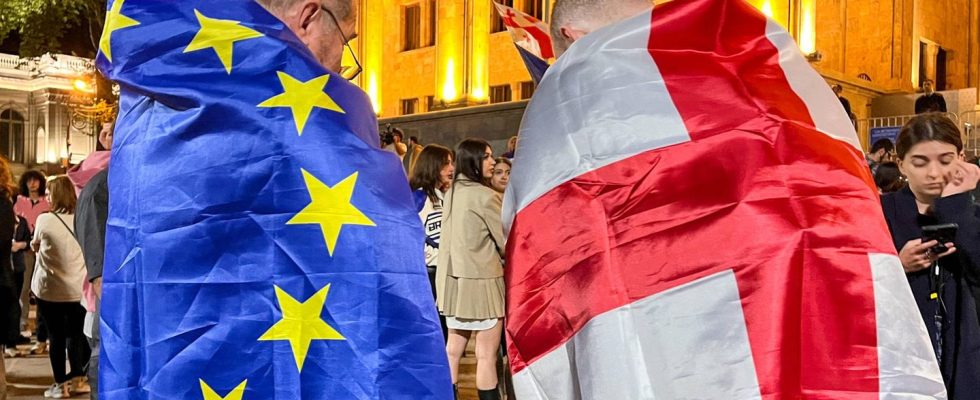questions and answers
The government in Georgia is planning a new law and the masses are protesting. What’s going on there?
The demonstrators in Tbilisi want to see Georgia in the EU soon
© Itar-Tass / Imago Images
In Georgia, thousands take to the streets to demonstrate against a government bill. But who are the demonstrators and what are they resisting?
What are Georgians demonstrating against?
A law called “On Transparency of Foreign Influence” has passed its second reading in parliament despite protests. It stipulates that non-governmental organizations that receive more than 20 percent of their money from abroad must disclose its origin.
What do critics say about this?
Observers accuse the government of the former Soviet republic of drafting the planned law along the lines of a Russian “agent” law in order to hinder the work of critical associations and media. In Russia, numerous organizations and individuals are branded as “foreign agents,” which often causes major problems for those affected. Critics see the measure as a means of political repression to silence critics.
What are the protesters most afraid of?
The Georgian Dream party, which has been in power since 2012, is becoming increasingly authoritarian ahead of the parliamentary elections in the fall. The Georgians fear that the political situation could worsen further as a result of the new law – if it is approved in the final reading. This could also endanger the country’s accession to the EU, which pro-European citizens are hoping for.
How does the government explain its course?
Prime Minister Iraqi Kobachidze said at a press conference on Wednesday that the adoption of the law would protect the country from polarization and radicalization in the long term. At the same time, he justified the police’s harsh actions: the law enforcement officers only acted within the framework of the law.
Illustrated book “Forgotten Splendor”
Lost places from Scotland to Georgia – the morbid charm of Europe
How does the EU react?
The EU foreign policy chief Josep Borrell criticized the police operation against peaceful demonstrators. “Georgia is a candidate for EU membership. I call on the authorities to guarantee the right to peaceful assembly,” he wrote on the social network X (formerly Twitter). “The use of force to suppress this is unacceptable.”
If parliament passes the controversial law, the former Soviet republic has no chance of joining the EU, according to Green Party politician Anton Hofreiter. “With the so-called agent law, Georgia cannot become part of the EU,” said the chairman of the European Committee in the Bundestag to the editorial network Germany (RND). “The planned law to restrict the rights of homosexuals is also against EU law. In Georgia, democracy is at stake.”
What does the international community say?
UN Human Rights Commissioner Volker Türk called on Georgia’s government on Thursday to drop the law. He criticized the fact that media and non-governmental organizations that receive money from abroad are described as organizations “acting in the interests of a foreign power.” Such a statement threatens the right to freedom of expression and freedom of association.
He also criticized the security forces’ “unnecessary and disproportionate use of force” against demonstrators in Georgia. Several people were injured the night before as a result of water cannon and tear gas attacks.

